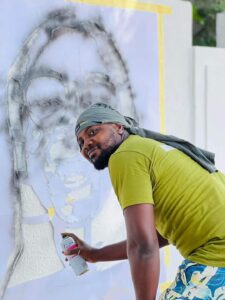My paintings are my sermons – Alberic Kouassi
By Olivia Acheampong

I grapple with connecting my artistic work with my faith, because to me, faith is a deeply personal matter between an individual and their God. However, I am intrigued by certain African practices regarding religious matters. What is our spiritual place today as Africans? Do we lean towards Christianity, Islam, or the worship of statues and masks? What is our role in a society that seems lost? My paintings are therefore the questions I pose to society. They are an invitation for each person to connect with God. What matters most to me is living daily for God through our relationships with the people around us.
Connections for evangelism
I trained at Ecole des Beaux Arts d’Abidjan (School of Fine Arts of Abidjan). Alongside my job as an art teacher, I travel around participating in exhibitions and selling paintings. I also do a lot of graffiti and street art. I love missions and evangelism, and during art gatherings, I find subtle ways to present Christ to attendees.
I see art as an amiable tool for reaching others with the Gospel. Evangelizing to others is good, but sometimes, constantly badgering people about God can make them distance themselves, or feel uneasy and pressured. However, painting and art are recreational and attract people. During mission programs, we can take a break and allow people some entertainment. It could be an art workshop where we take them into the street and paint on walls.
In 2021, I did wall paintings with prisoners in Abidjan. Later, when some of them were released, they contacted me. They said they loved what we did together in the prison, and wanted to become painters. Some of those I trained are now professionals who earn a living through painting.
My creations are meant to initiate religious debates and allow people to discuss what is spiritually wrong with society. We all talk about similar societal problems: poverty, education, health, etc.; however, we rarely discuss the religious dimension. I want people to search together and find a spiritual solution to these problems because things are primarily spiritual before they manifest physically.
Addressing religious hostilities
Religious conversations can be complicated and dangerous; so, my art also addresses religious intolerance. I did an exposition in an Ivorian village a year ago and created an artwork with a lot of Jesus crosses in it. They watched me work on the painting all day, but at night, some people woke me up with news that the indigenes had destroyed my work. I went to the location and found an agitated crowd. They said they had welcomed and treated me well, but I wanted to provoke them with my crosses. They accused me of trying to convert them, and insisted they didn’t want to see my art in their village. The experience traumatized me.
As a Christian whose art is meant to speak to the minds and souls of others, I have come to appreciate the animosity missionaries face. I aim to convey the message of respect for the practices of others. While our desire is that everyone accepts Jesus Christ into their lives, the world doesn’t always conform to our wishes. If you coexist with neighbours who practice another faith, it is important to respect their choice and foster harmony.
Challenges of Christian artists
One of the challenges we face as Christian artists is discrimination. We are often approached by questionable organizations that promise us success if we compromise and collaborate with them. The school where I teach currently used to be dominated by Freemasons. If you weren’t a Freemason, you couldn’t teach there. Through persistent prayer and effort, God intervened and they became considerate. Sometimes exhibition opportunities are also denied us.
Taking it upon yourself to do missions and reach lost souls may not be easy, but we know that God is in control.
PLEASE PRAY:
• For the Holy Spirit to keep inspiring Alberic’s artworks.
• That his artworks will open doors for spiritual and social transformation.
